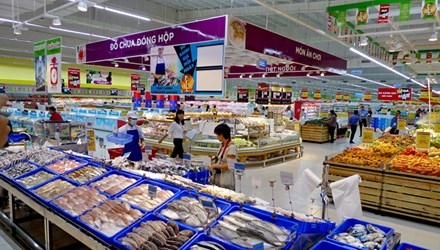 Op-Ed
Op-Ed

Right after buying Big C - the biggest supermarket chain in Việt Nam - for more than US$1 billion, Thai’s Central Group allegedly requeested higher rates of discount from Vietnamese suppliers.
 |
| According to Việt Nam Association of Seafood Exporters and Producers (VASEP), Big C asked for an increase of 4.25-5 per cent over the current discount rates, which are already the highest discounted rates any supermarket can receive. — Photo dantri,com.vn |
Ngọc Bích
Viet Nam News Right after buying Big C - the biggest supermarket chain in Việt Nam - for more than US$1 billion, Thai’s Central Group allegedly requeested higher rates of discount from Vietnamese suppliers.
The request, though unconfirmed by the supermarket’s representative, once again highlights enterprises’ growing concerns due to the penetration of foreign retailers.
According to Việt Nam Association of Seafood Exporters and Producers (VASEP), Big C asked for an increase of 4.25-5 per cent over the current discount rates, which are already the highest discounted rates any supermarket can receive.
The average discount level association members now offer Big C is between 17 and 20 per cent. VASEP’s deputy general secretary said that under the difficult current economic conditions, no companies could afford to satisfy the harsh demand. Or they would be deprived of all their profits.
The request is a wise move by the supermarket owner: a strategy to dominate the Vietnamese market. It is described as “killing two birds with one stone”.
First, by raising the discount rates, the retailer will easily eliminate Vietnamese goods from their shelves. Most Vietnamese suppliers are small- and medium-sized enterprises, unable to survive on minimal profits alone. So Vietnamese goods would be replaced by products made in Thailand.
Second, with higher discount rates, the supermarket would have an advantage and lower its prices even more. This will be a magnet for consumers. It will help Big C take more market share from local retailers. Gradually, local retailers will lose their positions on the home playing field.
In such a situation, it is clear the Government could not intervene: because the trading agreement between retailer and supplier was market-based. An official from the Ministry of Industry and Trade’s Domestic Market Department confirmed the Government could not do anything - unless there was evidence to prove Big C discriminated against Vietnamese enterprises versus Thai enterprises. No such evidence exists.
The official’s response was like throwing cold water on enterprises long accustomed to the Government’s administrative orders and to counting on State protection.
But the official’s response must be applauded. The country is making progress in calling for recognition of a market-ruled economy.
We do not have to wait until the establishment of the ASEAN Economic Community - or to wait for foreign acquisition of local supermarkets - to worry about the domination of foreign goods on the domestic market.
Foreign products overwhelming the domestic market has been predictable since Việt Nam opened its market.
There is a paradox. Foreign products - such as plastic goods made in Thailand, or electrical appliances made in Japan - have long been favoured by Vietnamese customers, even though they cost more than local products. Foreign products are better quality and feature eye-catching designs.
Even before foreign products officially debut on supermarket shelves, many middle income people look for - and are ready to pay for - US, Japanese and Australian products through unofficial channels. Such channels include products imported by individuals in small quantities and sold online - what Vietnamese consumers call “hàng xách tay”.
So before criticising that Vietnamese goods are being treated unfairly, local producers should ask themselves why the Thai owner of Big C could make such an “unreasonable proposal.”
For now, Big C denies ever asking for higher discounts. But a Big C request for such higher discounts is still possible in the future, if Vietnamese goods remain unable to win the trust of customers.
One food company owner said her product used to struggle to find a position in local supermarkets. But when local customers began hunting for her product, supermarkets approached her company and offered her a deal. During negotiations, supermarkets often have to compromise since her product now has the advantage of being a customer favourite, she said.
The lesson learned is this: if Vietnamese enterprises are to win on the market, they must improve product quality and design, as well as invest more in advertising to promote their product brand name.
And to avoid overdependence on foreign-owned supermarkets, Vietnamese firms should establish their own distribution channels.
Products now sold in supermarkets and trading centres only account for 10-15 per cent of the retail system’s capacity. Vietnamese customers are more familiar with convenience stores and household-owned shops in traditional markets. Such stores and shops are easier to access because most of the 90 million Vietnamese consumers drive motorbikes. And the stores and traditional markets are often located within residential areas.
Vietnamese producers should not worry about which goods will be chosen by supermarkets to sell. They should focus on increasing their competitiveness instead. Vietnamese producers should co-operate with each other, and with foreign partners, to reach win-win outcomes, rather than remaining hostile.
Given the fact of increasing integration and market economy, local producers should know they will be driven out of the market if they fail to build a reputation and maintain their strength.
So local producers must save themselves, instead of just waiting for the Government to throw them a lifeline. The Government can only help enterprises save time and money by simplifying administrative procedures - and by creating a favourable business environment.
It is quite late for Vietnamese enterprises to change their minds.
But better late than never!